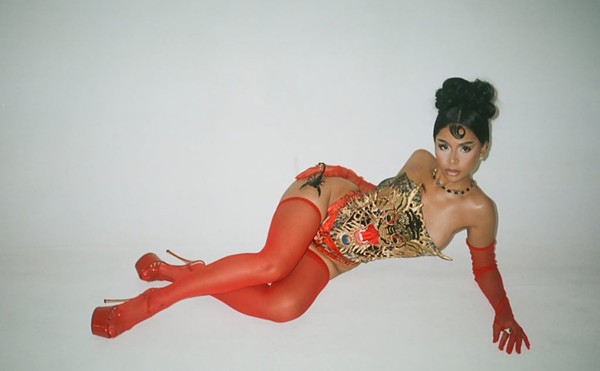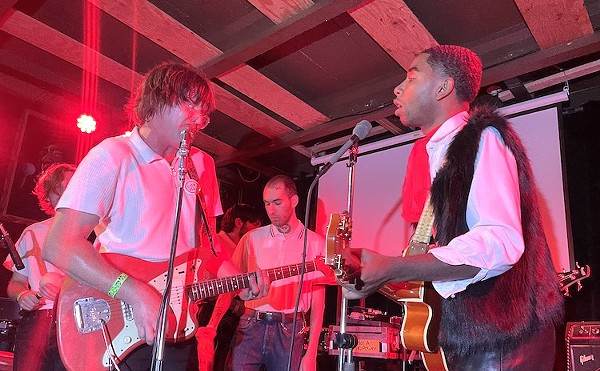You can't get more than a sentence into any writing about Billie Holiday, a.k.a. Lady Day, without being ambushed by the word tragedy. She is, in fact, often used to make the point that fame is a bitch -- the implication being that the fame-challenged can take heart that they've been fortunate not to have been subjected to their quarter-hour of it.
Not to minimize her profile, but let's get it out of the way in 25 words or less: Child of a teen mother. Raped at 10. Self-destructive. Heroin addict. Jazz singer.
A point often missed is what wondrous music Holiday made before all her dues came due. The nearly 200 recordings on this 10-CD Sony set were originally on Columbia subsidiaries Brunswick, Vocalion and Okeh. Recorded between 1933 and 1944, they represent the fat years: the time of the rites of spring before the leaves began to fall and the winter chill crept, like global icing, through her body and soul. The time when she could still credibly fill the designated girl-singer-with-the-band slot, and could still tra-la-la her way through the often inane Tin Pan Alley novelty numbers touting some poopsy-cute take on love.
Backing her are the bands of Benny Goodman, the remarkable Teddy Wilson, Count Basie, Duke Ellington and a crew under her own name. The songs are mostly Broadway show tunes, meant to be sung by generic all-American, white-girl band singers, not by a black teen-ager, as she was on the earliest of the recordings. They represent her journeyman's years. That she managed to make any of them memorable is a marvel.
At about the point of her December 1935 sides with Teddy Wilson, the happy-go-lucky, clock-punching, piecework feel to the material begins to give way to more serious and solid stuff. There is less of the rush and push of the dance-hall tempos that characterized the pop culture's discovery of swing that turned it into Swing. There is more of an after-hours, small-club attitude, with the sass and swagger of a bluesier groove.
It's a rhythm that Billie can work with. Work inside, and behind. Like she's in the observation car, laid-back, digging the landscape whizzing by, while the others are already arriving at the next station. But, in affirmation of the jazz physics of Einstein's theory of relativity, and in the warp of her own fine and mellow time, she gets there with them.
She was still in her early 20s; a dime was a dollar; madmen hobnailed European cobblestones, imposing their ill will; and Billie already had it figured out. Talking those mostly jukebox-fodder tunes about dreams and moonbeams, cozy nooks and babbling brooks, she mined them for their irony and subtext and presented them as nullifiers, buffers, antidepressants against a plague of the world's afflictions.
By the time we get to "These Foolish Things" and "I Cried for You" in 1936, we're assured that the mature Billie is on track, stretching vowels like she's pulling taffy and tweaking it off with a little twittering trill as an ending accent.
Despite the rate of their production -- an average of four sides recorded bimonthly during the next few years -- the percentage of wheat over chaff increases in these get-togethers. They're stroking and trucking. It's a movable party. "Summertime," "Billie's Blues" and "A Fine Romance" are the proof.
The quality of her support is stellar. There are no weak spots in the lineup. All of her bandsmen sound like nobody but their young cutting-edge selves: Johnny Hodges, Charlie Shavers, Buck Clayton, Ben Webster. "I Can't Give You Anything But Love" and "I've Got My Love to Keep Me Warm" are the proof.
Lester "Pres" Young climbs on in January 1937. His lyrical, light-as-low-cal whipped cream is the cushion for Holiday's floating magic carpet. Lady and Pres have a closeness so extraordinary it was either divinely ordained or an incredibly serendipitous union of kindred -- star-crossed, riding on the Billie Holiday Express, rolling though a field of gems. Every so often they reach down to scoop up a handful. "All of Me," "God Bless the Child," "I Cover the Water-front," "Love Me or Leave Me" are the proof. The dark cores of those tunes are perfect matches for her feather-light wisp of a voice with the whiff of pirouetting rasp. They are sorrow songs for a country emerging from the bleak, drab Depression -- a nation that also is staggering toward the dread and bombast of the coming war.
This is the likeness of Billie to keep propped on the mantle of our remembrances. Her voice at its technical best, her inflections, her pauses and pronunciations personalizing and universalizing the lyrics to the point that -- after a while -- words are transformed into notes. She is no longer vocalist, torch singer; she is chantress, soloist, one of the horns (more saxophone than the trumpet that wags often compare her to).
It is music with the edge of danger in the always possible sparks and explosion of a brilliant red fugue, or a bouquet of luminous blue against a foreground of grainy black and white. Her voice is as haunting in its immediacy and in its echo as a train's whistle resounding across the darkened sweep of our phobias and euphoria.

















